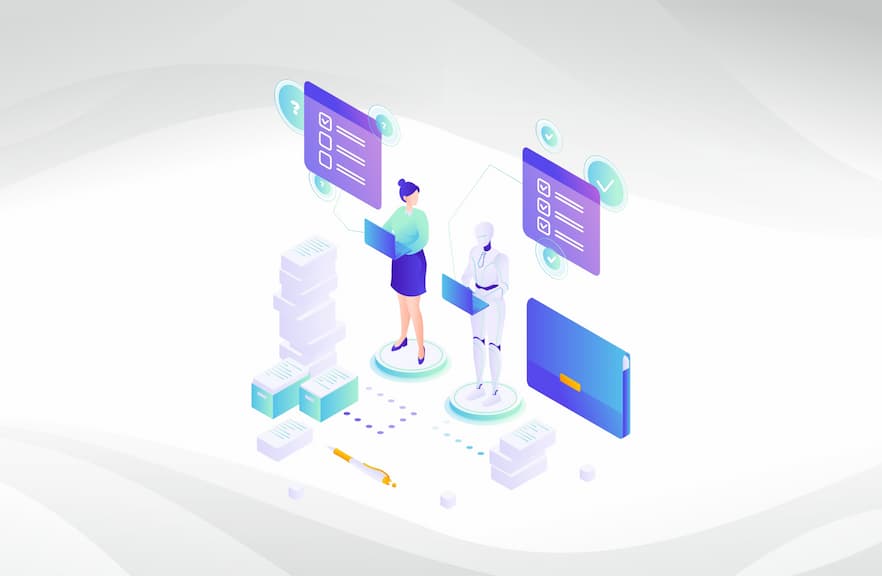Artificial intelligence (AI) is transforming every sector with significant use cases. In 2023, 37% of businesses use AI to manage operations and boost performance. This blog examines the utility of AI among businesses and focuses on a few examples where AI has facilitated various sectors in achieving their goals and enhancing their customers’ value propositions. In addition, AI is helpful in the following ways:
- Delivering competitive intelligence: Competitive intelligence detects relevant competitors and gathers information about their strengths and weaknesses. It also helps track competitors’ actions, such as marketing campaigns, significant events, and product launches.
- Optimizing prices: AI helps businesses define optimal prices to remain competitive and keep customers loyal. Factors like brand awareness, market demand, and seasons affect your pricing strategy, so adapting it according to real-time data is crucial.
- Providing great in-store experience: If you have online and physical stores, you can take the regular in-store expertise to new heights. AI models can analyze your consumers’ data and let you know about their last visits and favorite products. AI will help you by providing them with information about products, personalized discounts, recommendations, and loyalty programs.
AI Use Cases Across Industries
Businesses can gain from enhanced forecasting accuracy, automated hiring, improved customer communications, and better cybersecurity by integrating AI into daily operations. In addition, industry sectors other than tech companies can also use AI in their plans, including marketing and human resources.
Sales
AI helps businesses identify relevant competitors and gather information about their strengths and weaknesses. AI in sales processes increases leads by an average of 50%. It helps teams to automate mundane tasks like scheduling meetings and allows employees to concentrate on important matters, such as closing deals.
- Enhanced customer support: AI-powered chatbots can boost sales by 67%, send prospects customized emails, and resolve simple queries without human involvement.
- Sales forecasting: By analyzing customer interactions and historical data, AI algorithms provide precise predictions about market demand, new prospects to reach out to, and deals that are most likely to close.
- Personalized offers: AI analyzes customers’ buying behavior and search histories and provides them with tailored recommendations about products that are similar to what they are looking for.
Marketing
Brand awareness, market demand, and seasons affect product pricing. AI offers real-time data since such data is crucial for businesses to adapt on the fly. AI models can analyze consumers’ data and provide vital information about their shopping and buying preferences, personalized recommendations, and fine-tune loyalty programs.
Marketers use AI to get valuable insights about their target audiences, attract relevant leads, and enhance conversion rates. In addition, over 60% of customers are willing to use AI for better brand interaction, so it’s high time marketers implement this technology. It tracks factors such as marketing campaigns, events, and product launches from competitors. It also analyzes the chatter around the competition, uses their flaws as advantages, and identifies new marketing channels to disseminate information.
- Effective audience analysis: By analyzing customers’ preferences, pain points, feedback, and credit scores, AI can help target them with relevant ads and messages, build a solid emotional connection, and transform them into brand ambassadors.
- Personalized website experience: Using AI, businesses can identify their users’ locations, devices, buying histories, and interactions to detect patterns and provide them with the most relevant products, notifications, and content.
- Increased campaign ROI: Marketers can gain meaningful results from data and benefit from them in real-time. AI is a fantastic tool for detecting the most relevant ad placements, finding marketing channels where users are active, and obtaining detailed reports to enhance future campaigns.
Accounting and Finance
Almost 80% of business owners claim that AI-based accounting software is one of the critical factors in enhancing their organization’s productivity. This is because AI helps accountants reveal hidden patterns and automate repetitive tasks.
- Eliminate time-consuming tasks: Businesses can minimize resources on evaluating expense reports, analyzing documents, and reconciling accounts with AI. It allows them more time to focus on strategic activities like competitive position monitoring and customer profitability analysis.
- Predictive analytics: AI in predictive analytics can help businesses anticipate possible outcomes, make accurate predictions, and develop precise demand planning. It is also an excellent tool for providing clients with solid financial advice and setting up accurately estimated budgets.
Human Resources
With countless resumes and data to analyze, HR managers can use AI to spot the perfect applicants much faster.
- Choose better candidates: AI-powered algorithms will analyze applicants’ job experience, soft and hard skills, interests, and career goals to identify the perfect match from a pool of candidates.
- Eliminate hiring discrimination: Computers and algorithms are impartial, making them a good match for unbiased hiring and recruitment.
Information Technology
Applying AI to IT operations and tasks can help teams work more efficiently and detect issues before they affect users.
- Reduced operating costs: AI-powered software maintenance tools can help specialists spot and eliminate any threats before they inflict real damage. Without slow and time-consuming manual management, fixing bugs in the initial stages and reducing operating costs is easier.
- Faster digital transformation: AI will help businesses manage data and reduce friction in operations — data movement from on-premises to cloud computing or data migration from a monolith architecture to microservices.
Contact Centers
Contact centers need reliable AI solutions to understand their leads and clients, resolve urgent queries, and boost loyalty when dealing with vast data.
- Prioritize queries: With tons of requests, it can be challenging for support reps to detect the most urgent ones and assist customers quickly. AI algorithms can recognize sentences with a top-priority indicator that requires an immediate response.
- Reach out to relevant leads: Contacting people not interested in your services can be frustrating. AI models will analyze target audiences and help you find high-quality prospects more likely to interact with you. AI chatbots are beneficial for presenting personalized offers and answering questions.
AI applications have streamlined business operations, enhanced revenue, and delivered cost savings to businesses. Currently, the percentage of companies using AI hasn’t crossed the halfway mark. Still, as more and more businesses become aware of the benefits and utilities of AI, it will emerge as a must-have in every aspect of a business.



